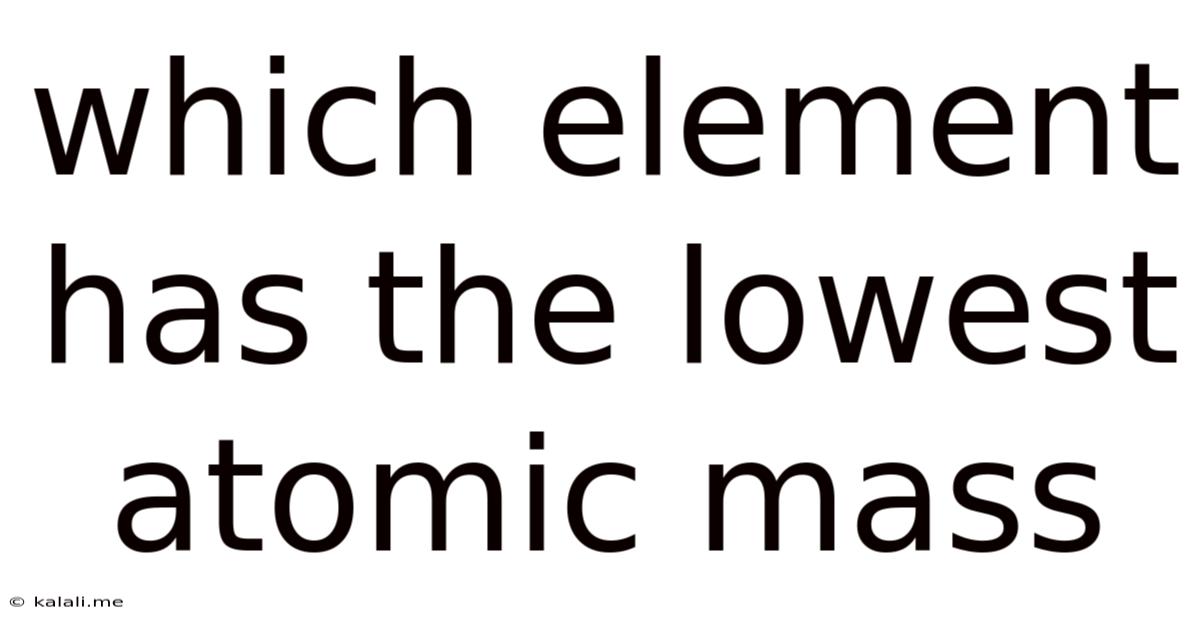Which Element Has The Lowest Atomic Mass
Kalali
Jun 11, 2025 · 3 min read

Table of Contents
Which Element Has the Lowest Atomic Mass? Unlocking the Secrets of Hydrogen
The element with the lowest atomic mass is hydrogen. This seemingly simple fact holds significant implications in chemistry, physics, and our understanding of the universe. This article delves into the reasons behind hydrogen's low atomic mass, explores its unique properties, and touches upon its importance in various fields.
Hydrogen, with an atomic mass of approximately 1.008 atomic mass units (amu), claims the title of the lightest element on the periodic table. This low mass stems from its simple atomic structure: a single proton in the nucleus and a single electron orbiting it. Compared to other elements with multiple protons and neutrons, hydrogen's minimal composition results in its remarkably low mass. Understanding this fundamental characteristic is key to understanding its behavior and applications.
Why is Hydrogen's Atomic Mass Not Exactly 1?
While hydrogen's most common isotope has a mass of approximately 1 amu, the slight deviation from a whole number (1.008 amu) is due to the existence of isotopes. Isotopes are atoms of the same element with the same number of protons but a different number of neutrons. The most abundant isotope of hydrogen, protium (¹H), has one proton and no neutrons. However, deuterium (²H) possesses one proton and one neutron, and tritium (³H) contains one proton and two neutrons. The average atomic mass accounts for the natural abundance of these isotopes, resulting in the slightly higher value of 1.008 amu. This isotopic variation is a common phenomenon among elements and contributes to the nuances of atomic mass calculations.
The Significance of Hydrogen's Low Atomic Mass
Hydrogen's low atomic mass plays a crucial role in several key areas:
-
Nuclear Fusion: In stars, hydrogen nuclei fuse together to form helium, releasing vast amounts of energy. This process, known as nuclear fusion, powers stars and is a potential source of clean energy on Earth. The low mass of hydrogen is a critical factor in the efficiency of this fusion reaction.
-
Chemical Reactions: Hydrogen's low mass influences its reactivity and its ability to readily form bonds with other elements. This makes it a crucial component in countless chemical reactions and compounds.
-
Quantum Mechanics: Hydrogen's simplicity makes it an ideal subject for studying quantum mechanics principles. Its atomic structure is relatively easy to model and understand, providing crucial insights into the behaviour of atoms and electrons.
-
Isotopic Tracers: The different isotopes of hydrogen (protium, deuterium, and tritium) are used as tracers in various scientific fields, including biology and chemistry. Their different masses allow scientists to track the movement and transformations of molecules.
Beyond the Basics: Exploring Hydrogen's Unique Properties
The low atomic mass isn't the only thing that makes hydrogen remarkable. Its unique properties, such as its high reactivity and ability to exist in various forms (atomic, diatomic, and ionic), contribute to its diverse applications in various industries and scientific research. Understanding these properties alongside its low mass provides a complete picture of this essential element.
In conclusion, hydrogen holds the distinction of having the lowest atomic mass among all elements. This fundamental characteristic, coupled with its other unique properties, makes it an element of immense scientific and practical significance. From powering stars to fueling potential clean energy solutions, hydrogen's role in our world is vast and continues to be explored.
Latest Posts
Latest Posts
-
How Much Is 1 8 And 1 8 Teaspoon
Jul 01, 2025
-
How Many Feet In A Quarter Acre
Jul 01, 2025
-
How Many Feet Is Half An Acre
Jul 01, 2025
-
If I Was Born In 2004 How Old Am I
Jul 01, 2025
-
How Long Would It Take To Drive 2000 Miles
Jul 01, 2025
Related Post
Thank you for visiting our website which covers about Which Element Has The Lowest Atomic Mass . We hope the information provided has been useful to you. Feel free to contact us if you have any questions or need further assistance. See you next time and don't miss to bookmark.